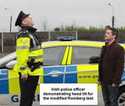 Until recently, the DWI eye test, which is also known as the Horizontal Gaze Nystagmus (HGN) test, was considered the most reliable of the three tests in the National Highway Traffic Safety Administration three-test battery. Now, it is considered the least reliable one.
Until recently, the DWI eye test, which is also known as the Horizontal Gaze Nystagmus (HGN) test, was considered the most reliable of the three tests in the National Highway Traffic Safety Administration three-test battery. Now, it is considered the least reliable one.
Most people are familiar with HGN tests. Test administrators instruct subjects to hold their heads still and track moving objects with only their eyes. That moving object is usually a fingertip or ink pen. If the subject’s pupil moves involuntarily at certain angles, the subject probably has nystagmus.
That test sounds really simple, but it is actually very complex. Tarrant County criminal law judges have only recently begun to appreciate all these complexities.
What is Nystagmus?
Horizontal Gaze Nystagmus is a medical condition which is also known as “lazy eye.” A significant number of people have a lazy eye, but the symptoms are so subtle they may not know it. So, many defendants could not pass the HGN test whether they were drunk or sober.
Alcohol intoxication causes HGN. That’s a scientific fact. But alcohol is not the only cause of lazy eye. In fact, it is not even the leading cause. That distinction goes to a childhood brain injury or a genetic abnormality. Other causes of nystagmus include certain medications and brain disorders, like epilepsy.
HGN Test Flaws
So, there is a good chance that alcohol did not cause a particular subject’s nystagmus. There is also a very good chance the test itself was unreliable.
The nystagmus eye test is about 80 percent reliable if it is administered under controlled conditions. But roadside HGN test conditions are anything but controlled. The sky is dark and cars whiz past the scene at high speeds with their headlights on.
Moreover, squad car lights usually flash in the distance. These rotating, colorful strobe lights may cause flicker vertigo. Many pilots have this condition after looking at flickering lights, such as airport beacons or instrument lights. Police squad cars intentionally cause flicker vertigo, to disorient suspects. The disorientation could affect anyone who sees the lights, including DWI defendants.
The Fallout
Because conditions other than intoxication can cause nystagmus, and because there are issues with the test, many criminal judges have rethought the HGN’s place in DWI prosecutions.
Many judges allow HGN results as evidence of probable cause for arrest, but they do not allow the test to prove guilt or innocence. This difference is especially important in Breathalyzer refusal cases. If an attorney can have HGN test results excluded, the prosecutor loses a valuable piece of circumstantial evidence. The lack of evidence gives a defense attorney an edge.
Undermining the controversial HGN test is just one way to beat a DWI. For a free consultation with an experienced criminal defense attorney in Fort Worth, contact Herreth Law. Home and jail visits are available.

